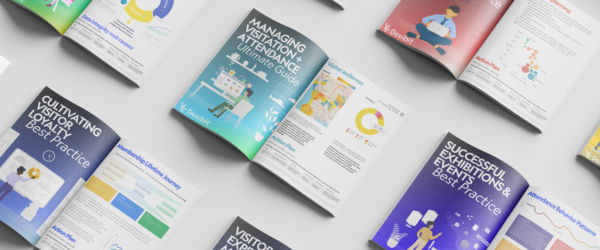When the prompt becomes the purchase
- In Blog
- ai, booking, ChatGPT, Generative, online travel agency, ota, Ticket
- 5 min read
AI and the future of advance pass bookings and agency channels: what attractions need to know about AI powered ticketing
There’s a quiet shift underway in the travel industry, one with seismic implications. As generative AI starts to move from inspiration to action, the way visitors book their tickets may be headed for a radical overhaul. Today, it’s one thing to ask AI for itinerary ideas, or checking in on opening hours, something data in Dexibit already shows as prevalent for visitors. Tomorrow, it might be clicking ‘buy now’ on a ticket, the visitor completing their visit planning without ever touching your website or interacting with your ticketing system. So where does that leave your distribution strategy and how much of it is under your control?
From planning partner to purchase power
OTAs and experience marketplaces carved out their space by solving for convenience and curation, focusing on bundling flights, stays and transport. Meanwhile, platforms like GetYourGuide, Fever and Klook dominate the local activity layer, from museum tickets to tours and events.
Generative AI is set to disrupt both. Instead of browsing, visitors are now asking: “Plan a weekend in Chicago with two museum visits and a ferry ride” and receiving not just suggestions, but booked itineraries.
If the AI makes the purchase decision and executes it, it becomes the new gatekeeper. And as we know, every gatekeeper takes a toll. And we’re not just talking about booking revenue – it’s a bigger issue of attention… therefore attendance (even for free admission or activities).
Now is a critical moment for attractions to reassess their dependence on third party ticketing channels. How much of your ticket sales come through OTAs or marketplaces today? How does that exposure change by your markets, margin or seasonality? How much are you giving away in commission? What would a simulation of your margin look like if you don’t have an OTA exposure today and might have to have an AI concierge one tomorrow?
What happens when that intermediary isn’t just listing your product, but actively controlling discovery, decision making and checkout? It’s one thing to compete in a marketplace. It’s another when you’re not even visible unless the AI chooses you.
Monopoly by algorithm?
AI platforms, often owned by the same tech giants that already dominate search and social, are becoming the interface for travel planning. If those platforms own the customer conversation and also own the booking funnel, they’re positioned to take a growing cut of revenue by leveraging the power they have in owning the visitor relationship.
In that world, your brand may be abstracted away, your ability to retarget limited and your negotiating power diminished or extinguished altogether.
Worse still, based on what we’ve seen already, AI platforms may not be forthcoming with data on how visitors found you, what factors influenced your ranking, or why you were (or weren’t) selected, a departure from the Google era. You could be flying blind when it comes to optimizing your visibility or performance. And you might not even know what the AI is optimizing for, in its own interests or the visitor’s, whether that’s price, availability, convenience, or even paid influence.
For attractions, the AI driven future of ticketing is both a risk and an opportunity. Here’s what to consider:
Audit your distribution mix: What percentage of your sales are direct versus via third parties?
Assess your margin exposure: If commission fees shift higher under AI controlled booking, what’s your buffer?
Simulate an AI concierge channel layer: If you don’t share a proportion of your advance pass booking with an OTA channel right now, what would the impact look like if your channel mix changed to start including an AI concierge? What if it was significant?
Map your data readiness: Can your product be discovered and booked programmatically? Does your ticketing vendor or setup have API first capabilities, open APIs or structured feeds for programmatic access? Are they thinking about this future?
Strengthen your brand presence: Beyond SEO, are you prompt optimized for how visitors describe what you offer?
What’s coming in AI booking tech
Two major developments are accelerating the shift in ChatGPT alone:
ChatGPT Agent (e.g. ‘Operator’) for real bookings
OpenAI has launched ChatGPT Agent, which can autonomously navigate websites, fill web forms and even complete purchases (like flights or event tickets) with your permission and oversight. It functions like a smart browser you can watch in action. At the moment, it’s available to Plus/Pro/Team subscribers and limited to certain regions. But it’s rolling out more widely and bookings, reservations and ticket purchases are already supported in demo form.
Integrated in chat checkout
OpenAI is also developing a native checkout system in partnership with Shopify that will let users complete purchases entirely within ChatGPT, without needing to visit external websites. This is similar to a seamless Amazon style checkout inside the chat window, and is currently in early testing with selected commerce partners.
Over the coming months, both features are expected to expand to Plus/Pro subscribers globally and eventually become standard offerings. It’s reasonable to expect that by late 2025, visitors will be able to buy tickets to attractions like zoos, galleries, or ferry combos directly and securely within ChatGPT.
Taking back control
It’s time to rethink what control looks like in a world where AI intermediates everything. That might mean:
Defining KPIs beyond traffic and conversions to include visibility in AI queries and visitor intercept to understand prevalence growth trends
Shifting energies from Search Engine Optimization (SEO) to Generative Engine Optimization (GEO)
Investing in open, structured, machine readable data
Establishing a direct booking experience that’s AI friendly
Exploring first party data strategies to maintain a direct relationship with your audience
Side note: one helpful development in this space is the OCTO API specification, which AI may in future prefer – an open standard that enables seamless integration between ticketing platforms and distribution channels. OCTO provides a common language for availability, pricing, product info and booking. Attractions working with ticketing vendors aligned to OCTO will likely be far better positioned to plug into AI powered channels and future proof their digital distribution.
Bottom line? The future of ticketing isn’t just about platforms, it’s about power. Attractions that rethink their reliance on OTAs and experience marketplaces, proactively positioning themselves for AI discoverability, will be the ones still standing when the prompt becomes the purchase.
Get insights delivered right to your inbox
Want to learn more about Dexibit?
Talk to one of our expert team about your vision to discover your data strategy and see Dexibit in action.


